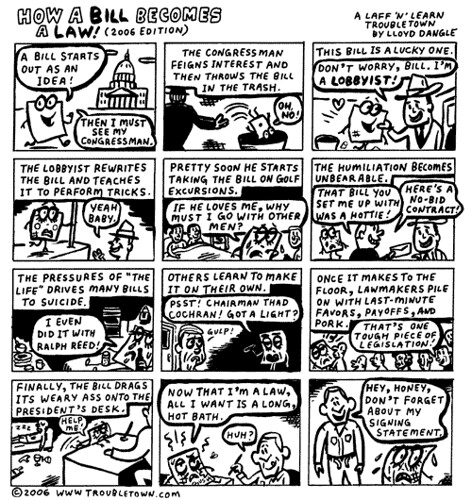Missing the most significant point: DC City Council potential for conflict of interest
The Post's lead editorial today is about Michael Brown, a lawyer-lobbyist who also is a City Councilman. The editorial, "Michael Brown, gambling man," makes the point that Brown was advocating for online gaming as a Councilmember, ostensibly to increase the city's tax revenues, but the fact is that the firm he was working for at the time has an extensive gaming practice, and would likely benefit if DC becomes another venue where gaming is legal.
The editorial goes on and on about this.
From the article:
Mr. Brown left Edwards Angell in January for what he said was “a better offer” at the Madison Group, a lobbying and consulting firm. At Edwards Angell, his title was senior public policy adviser in the government relations department, for which he says he was paid in the vicinity of $240,000 in 2010. When we asked what he did, he told us he lobbied Congress and the White House on behalf of a variety of clients whom he would not name. When we subsequently asked why we could not find any lobbying disclosure forms filed with the House of Representatives for him in 2010, he said lobbying is a loose term that includes “information gathering” and “strategy.” Mr. Brown disclosed his 2010 earnings in the annual filing of outside income that the Office of Campaign Finance required to be filed by May 15; rules don’t require disclosure of the source of income, but when we asked Mr. Brown named Edwards Angell.
In our discussions with Mr. Brown, he stressed his care in keeping his private duties separate from his public responsibilities. Initially he told us that he had not consulted with any D.C. officials about the ethics of sponsoring the gaming legislation but had cleared the activity internally with Edwards Angell. After we called the firm, a spokesman gave us this statement: “With respect to Michael Brown’s activities as a member of the DC Council, we maintained a strict boundary between the firm’s professional endeavors and Mr. Brown’s activities — as is the case with all of our professionals’ outside activities. Firm management was thus unaware in 2010 of Mr. Brown’s intent to sponsor legislation legalizing online gaming in the District.” Mr. Brown called us back and said that, after consulting with his former colleagues at Edwards Angell, he realized he had “misspoken” on that question.
The real issue is that DC City Council positions, which pay $130,538 per year (see "D.C. Council members bring in second-highest salaries among big cities" from the Examiner), are considered "part time" jobs, so that the Councilmembers are allowed to have other jobs. Those that do tend to work for firms which have a great number of interests involving the laws and regulations of the DC Government.
By deeming the jobs part-time, they are structurally set up to create conflicts of interest, because the firms most likely to hire DC Councilmembers for "part-time" work are likely to want to influence, directly or indirectly, how DC government operates and legislates.
End the jobs of Councilmembers as being part-time, and some (not all of course, as special interests are special interests) of the potential for conflict of interest will be reduced significantly.

How a bill becomes law. Llyod Dangle, Troubletown cartoon.
Labels: bad government, electoral politics and influence, good government, government contracting, government oversight, provision of public services



0 Comments:
Post a Comment
<< Home